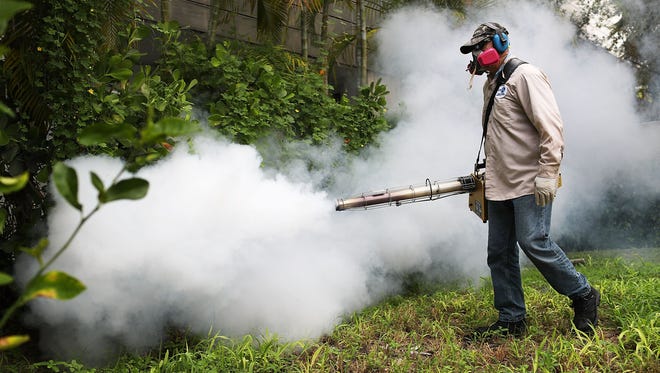Fla. finds Zika virus in U.S. mosquito for first time

For the first time in the continental United States, the Zika virus has been detected in trapped mosquitoes in a small area of Miami Beach, Florida officials said Thursday.
The Florida Department of Agriculture and Consumer Services said in a statement that the virus was found in three mosquito samples taken in a 1.5-square-mile area of Miami Beach, where cases have been detected in humans.
“This find is disappointing, but not surprising," said Commissioner of Agriculture Adam H. Putnam. "Florida is among the best in the nation when it comes to mosquito surveillance and control, and this detection enables us to continue to effectively target our resources."
Locally acquired cases of Zika in humans were confirmed last month, but this is the first time that teams have trapped a mosquito carrying the virus.
The health department said it had tested more than 40,000 mosquitoes since May, and that the three samples were the first to test positive. It said, however, that 95 samples taken subsequently in the same area turned up negative.
The virus, which is known to cause devastating birth defects, spreads from humans to mosquitoes and back to human through bites, but the insects, which have a lifespan of only a few weeks, do not spread the disease among their own population. People can also spread Zika through sex.
The first human cases of the virus in Florida surfaced in early August in an area roughly one square mile wide just north of downtown Miami. The area, known as Wynwood, is a popular destination for locals and tourists coming from Latin American countries where the virus has spread. The bulk of the more than 2,200 cases of the virus in the U.S. are related to travel.
Two weeks later, Zika surfaced in Miami Beach when health officials confirmed five people were infected in South Beach, the vibrant community across Biscayne Bay from the rest of Miami.
Other isolated cases not linked to travel outside the U.S. have been confirmed elsewhere in Miami-Dade county, as well as in neighboring counties and in the Tampa Bay area, totaling 47 for the state, the FDACS said.
Miami Beach Mayor Philip Levine said Thursday that the city would "continue to take a hardline" in the fight against Zika.
"We are aggressively working to eliminate any and all potential mosquito breeding grounds," he said. "We are also working closely with our partners at the state and the county to ensure all resources are effectively deployed. Together we can contain and eliminate all cases of Zika."
He also called on Congress to provide the "necessary emergency resources" to fight the spread of the virus.
Florida Gov. Rick Scott, responding to the latest findings, ordered stepped up measures, including increasing spraying and testing in the affected area. He also directed the department of Health to work with Florida international airports to provide bug repellant for travelers returning from countries experiencing outbreaks of the virus.